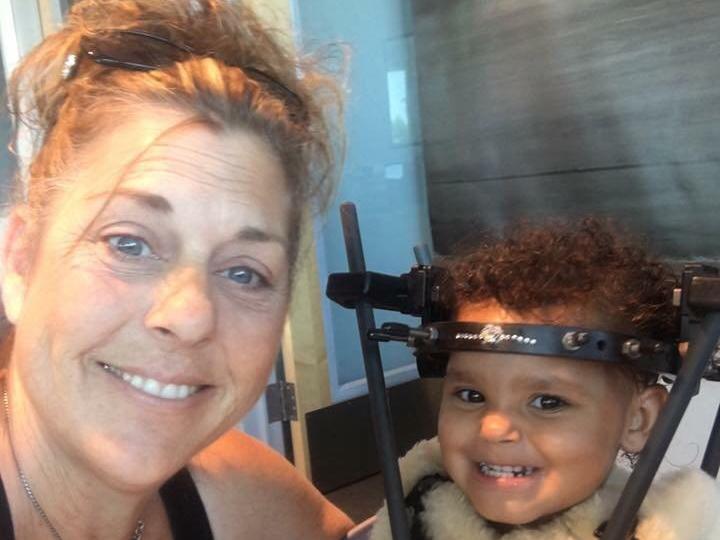Grandmother warns about forward-facing car seats after crash results in granddaughter being ‘internally decapitated’
'It makes me so sad that she’ll never be able to ride horses or do things other children can'

Your support helps us to tell the story
From reproductive rights to climate change to Big Tech, The Independent is on the ground when the story is developing. Whether it's investigating the financials of Elon Musk's pro-Trump PAC or producing our latest documentary, 'The A Word', which shines a light on the American women fighting for reproductive rights, we know how important it is to parse out the facts from the messaging.
At such a critical moment in US history, we need reporters on the ground. Your donation allows us to keep sending journalists to speak to both sides of the story.
The Independent is trusted by Americans across the entire political spectrum. And unlike many other quality news outlets, we choose not to lock Americans out of our reporting and analysis with paywalls. We believe quality journalism should be available to everyone, paid for by those who can afford it.
Your support makes all the difference.A grandmother has urged people not to use forward-facing car seats after her two-year-old granddaughter was "internally decapitated" in a car crash.
Aniyah Bennett’s skull detached from her spine after the vehicle she was travelling in with her mother Kimberly Bennett, 28, struck a brick pillar and overturned.
While her mother escaped with scratches, Aniyah was airlifted to hospital where doctors determined that the impact of the smash had "internally decapitated" her.
Internal decapitation or atlanto-occipital dislocation, is an injury fatal in 70 per cent of cases where the spinal column detaches from the skull base.
Surgeons successfully managed to reattach the child’s spine, but she also suffered a complete tear of her C5 nerve in the accident and lost movement in her right arm.
The child, now four, was also forced to wear a “halo” on her head for five months to hold her bones in place and had to relearn to walk. She remains partially paralysed.
Her grandmother and guardian Tanya Bender, 48, said that had she been in a rear-facing car seat instead of a forward-facing one, she would have not been hurt.
Rear-facing seats protect a child’s head, neck and back during frontal crashes, however Aniyah was in a front-facing seat so her head and neck jolted forward upon impact.
Property manager Ms Bender, of Central Point, Oregon, US, said: “It was so frightening to be on that plane with her when she was being airlifted. She was in such a serious life-threatening position and she was really scared.
“When we got to the hospital there was about 30 surgeons waiting for her – it was overwhelming. There the massive team explained to me that her spine had completely disconnected from her head and it was a miracle that her spinal cord was not damaged.
“Now she has limited feeling in her lower left arm and ribcage. Other than that she has no movement or feeling in her arm. Normal four-year-olds can get up and dress themselves but Aniyah can’t.
Ms Bender added that Aniyah was "really limited in what she does because she has to be so careful with her neck."
She said that she would "never jump on a trampoline or play on a team sport or be a cheerleader."
She added: “It makes me so sad that she’ll never be able to ride horses or do things other children can. She can’t even climb up the ladder to go down the slide at the park, it breaks my heart.
“I truly believe that Aniyah wouldn’t have suffered this injury had she been facing backward.”
The child spent two weeks at Doernbecher Children’s Hospital in Portland, Washington, recovering from the crash in May 2016.
Ms Bender, who cares for her granddaughter with her husband, truck driver Ed Bender, 52, added that she had to relearn how to walk and is still undergoing physiotherapy.
She said that she believed Aniyah would not have suffered the injuries she did had she been in a rear-facing car seat at the time of the accident.
The instructions on Aniyah’s car seat recommended that children who weighed between 23lbs and 40lbs could sit in a forward-facing car seat.
Laws on car seats vary by state. In many places, the rules state that children aged under one and weighing less than 20lbs must be restrained in rear-facing seats.
In Oregon, the law applies to children under the age of two.
Although Aniyah, who weighed 32lbs at the time of the accident, met the minimum requirements, Ms Bender says children should sit in rear-facing seats until they weigh 50lbs.
“I’ve been trying to spread the word by talking about Aniyah’s accident, because I think she would have been saved so much pain if we had done that,” she said. But despite everything, she’s such a happy child. Except for times when she was in intense pain, she never complained.
“We’re so happy she’s still here.”
SWNS
Join our commenting forum
Join thought-provoking conversations, follow other Independent readers and see their replies
Comments